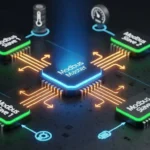Building energy management has emerged as a beacon of innovation and responsibility in the ever-evolving landscape of energy consumption and environmental stewardship. As the world grapples with the urgent need to curb emissions and reduce energy waste, the intelligent management of energy within buildings stands as a pivotal solution with the power to reshape our cities, businesses, and daily lives.
Building Energy Management
At its essence, building energy management involves strategically optimizing energy use within structures, whether residential, commercial, or industrial. It encompasses a range of technologies, practices, and strategies aimed at minimizing energy consumption, maximizing efficiency, and lowering operational costs.
The conventional approach to buildings often emphasizes aesthetics and functionality without adequately emphasizing energy efficiency. However, as the impacts of climate change intensify and energy costs rise, the paradigm shifts. Building energy management has taken center stage, turning buildings from energy consumers into energy savers.
The Technological Landscape
The integration of smart technologies is central to building energy management. The Internet of Things (IoT), data analytics, and real-time monitoring are at the heart of creating intelligent, data-driven buildings. Sensors and automation systems can adjust lighting, heating, cooling, and other building functions based on occupancy, time of day, and weather conditions.
Smart buildings aren’t merely about optimizing energy consumption; they also enhance the comfort and well-being of occupants. Improved indoor air quality, optimal temperature control, and efficient lighting create a more productive and pleasant environment.
Commercial Buildings
Commercial buildings, including offices, retail spaces, and hotels, are critical in adopting building energy management practices. These structures account for a significant portion of global energy consumption, and implementing energy-efficient systems and practices in commercial buildings can lead to substantial energy and cost savings.
Adopting green building certifications, such as LEED (Leadership in Energy and Environmental Design), has gained traction in the commercial sector. These certifications incentivize energy-efficient designs and technologies while demonstrating a commitment to sustainability and responsible resource management.
Residential Revolution
The residential sector is also transforming in terms of building energy management. Homeowners are becoming more conscious of their energy consumption patterns and seeking ways to lower their carbon footprint. Smart thermostats, energy-efficient appliances, and solar panels are becoming standard features in modern homes.
Moreover, residential buildings are increasingly being designed with energy efficiency in mind. Passive design principles, such as proper insulation, orientation, and efficient window placement, minimize the need for active energy consumption. These strategies lower energy bills and create more comfortable and sustainable living environments.
Challenges and the Way Forward
While the benefits of building energy management are compelling, challenges must be addressed. One significant hurdle is the upfront cost of implementing energy-efficient technologies and systems. However, it is essential to view these costs as investments that yield long-term benefits in energy savings, reduced operational costs, and enhanced property values.
Education and awareness also play a vital role in adopting building energy management practices. Many building owners and occupants may not be fully aware of the potential for energy savings or the impact of their actions. Public awareness campaigns, incentives, and educational programs can bridge this knowledge gap and encourage behavioral changes.
Sustainable Vision Beyond Buildings
The impacts of building energy management extend far beyond the walls of individual structures. When aggregated at the city level, these practices contribute to more sustainable urban environments. Smart cities, which prioritize energy-efficient buildings, renewable energy sources, and integrated transportation systems, create a vision of urban living that is both environmentally friendly and economically vibrant.
Furthermore, building energy management practices align with global efforts to decrease greenhouse gas emissions and mitigate climate change. As countries work to meet their carbon reduction targets, energy-efficient buildings emerge as low-hanging fruit with significant potential for emission reductions.
Conclusion
Building energy management is a cornerstone strategy that cannot be overlooked when pursuing a sustainable and resilient future. It has the potential to reshape our cities, businesses, and homes while contributing to global efforts to combat climate change and reduce energy waste. The tools and practices are available to transform energy consumption from smart technologies to behavioral changes.
As we navigate the challenges of the 21st century, building energy management symbolizes our capacity to adapt, innovate, and take responsibility for our impact on the planet. By embracing energy-efficient practices and creating intelligent buildings, we lay the foundation for a more sustainable, efficient, and harmonious coexistence with our environment. It’s time to build a resilient future, one energy-efficient building at a time.





